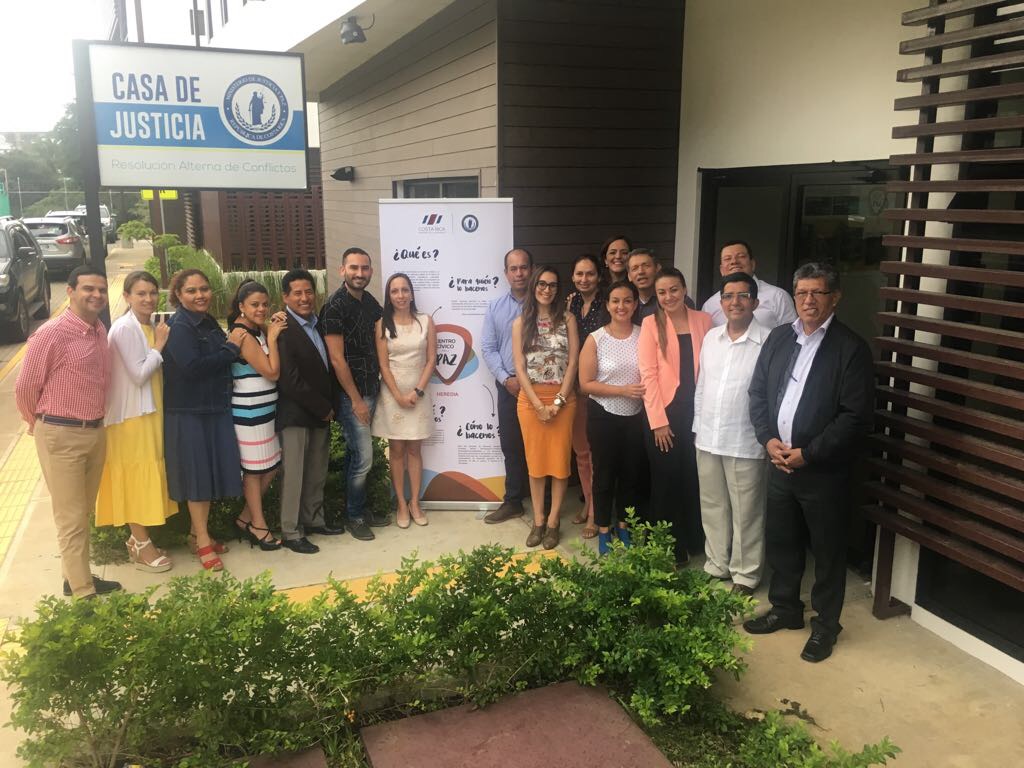Delegations of Mexico and Colombia on the second day of training in Costa Rica

During the second training day, delegations from the Judicial Authorities of Mexico and Colombia visited the Costa Rican Judicial School in the Ciudad Judicial in San Joaquín de Heredia.
This Tuesday, September 5, the delegations learned about the methodology used by the center in the training on the Subprogram for Specialization in Restorative Judicial Justice, which was led by the specialist in teaching methods of the Judicial School, Marisol Barboza Rodriguez, the coordinator of the multimedia production area, Eugenia Arias Quesada and the facilitator of the Restorative Justice program, Xiomara Arias Madrigal.
During the afternoon, they visited the Civic Center for Peace in Guararí de Heredia, where they visited its modern facilities and received information on the application of Restorative Justice in Houses of Justice, where, as a result of inter-institutional coordination with the Vice-Minister of Peace, the Juvenile Criminal Contraventional Processes are addressed.
The experience of Restorative Justice in Crimes of Violence of criminalization against the violence of women and indigenous peoples were part of the training topics they received on Wednesday, September 6, presentations by Lourdes Céspedez López and Gary Bonilla Garro and the prosecutor for Indigenous Affairs, Ariana Céspedes López, respectively. They also had an exhibition on the systematization of information from the Planning Directorate, presented by Marlen Vargas Benavides, and the theme on technology tools presented by Kirvin Bennett Mathurin and José Bonilla Boza from Information Technology.
The member of the Superior Council, Milena Conejo Aguilar, highlighted the importance of these spaces for exchange and experiences, for the strengthening of the Good Practices of these Restorative Justice projects at the regional level.
Claudia Lizeth Villavicencio Guadarrama, Mediator, Conciliator and Certified Facilitator of the Judiciary of the State of Mexico:
"This visit has been very enlightening and what surprised me the most is to see that Costa Rica manages a Restorative Justice program in a way that is linked to various institutions, that is, besides the Judicial Branch, it is also the three branches of the Costa Rican State where the community is being taken into account in the management of restorative programs. At the technical level and at the legislative level I believe that the program is quite rewarding, there is an integral attention of all the people who participate in a restorative process, and I believe that this is what has attracted the most attention to our team, this inter-institutional linkage.
Eduardo Castellanos Roso, Judge of the Peace and Justice Tribunal of Bogotá, Colombia:
"We are very surprised by all these programs that we have come to know a little more about and that Costa Rica has implemented in the area of Restorative Justice. In our country we have implemented some isolated exercises of Restorative Justice, but we did not have the idea as you have developed in a more comprehensive way, understanding it as a policy of the state, an open policy of the Judiciary. I believe that the exercise and the experience that you carry out is very valuable from many points of view, from the efficiency, optimization of resources and with which the state must provide the service of justice to its citizens, and from the vision that the citizen has of justice, the exercise is very valuable.







